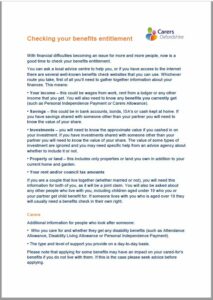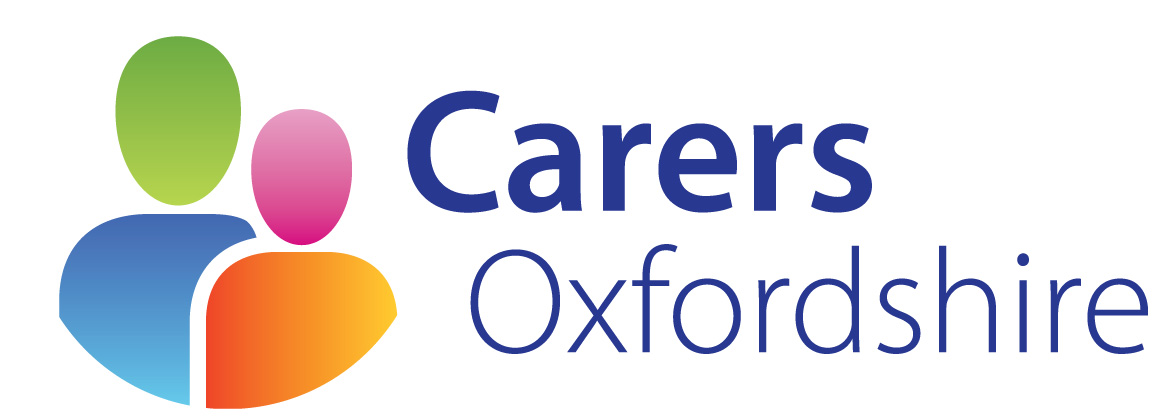Benefits
With the rising cost of living it’s more important than ever to find out about financial help. There are many different benefits and one-off payments available. The list is forever changing, which can be confusing when working out which ones you’re entitled to. We’ve put together an up-to-date list to help you.
It’s important to remember that there is a cap on benefits in some circumstances. If you already receive income-supporting benefits (such as Employment and Support Allowance, Job Seekers Allowance, Income Support or Tax Credits) get specialist advice before applying for new or additional benefits.

Benefits for carers of all ages
Cost of Living Payments have been made over the past two years to older people and people on certain benefits. There may be additional payments agreed by the government in the future. You don’t normally have to apply and payments appear in the same bank account that your benefits get paid into. These payments are not taxable and will not affect the benefits or tax credits you get.
Council Tax Reduction provides financial help towards your Council Tax. You may be eligible if you either claim means-tested benefits, are on a low income, or if you or someone you live with is disabled or severely mentally impaired. The discount ranges from 0-100% depending on income and circumstances. There are different rules for applicants of working age and pension age. To find out more contact your district council.
Housing Benefit can help you pay your rent if you’re unemployed, on a low income or claiming benefits. It’s being replaced by Universal Credit so you can only make a new claim if you’re pension age or are in supported, sheltered or temporary housing. You can apply as part of a pension credit claim or contact your district council.
Warm Home Discount Scheme offers a one-off £150 reduction on your electricity bill during the winter. You will qualify if you get the Guarantee Credit element of Pension Credit or if you are on a low income and have high energy costs. This reduction should be applied to your energy bill automatically.
Cold Weather Payment gives £25 for each 7-day period of very cold weather (0°C or below) between 1 November and 31 March. It is available if you get certain benefits or Support for Mortgage Interest. The discount will not affect your Warm Home Discount or winter fuel payment. There is no need to claim; it is paid automatically.
Waterhelp scheme from Thames Water offers financial support for low-income households, with either a 50% discount on your water bill or a bill cap. The scheme also provides support if your payments are behind. For more information visit www.thameswater.co.uk/support or call 0800 009 3652.
NHS Low Income Scheme provides support with healthcare costs including NHS prescriptions, dental care, and glasses. Eligibility for support depends on your income and savings.
Benefits for carers of working age
Carer’s Allowance is a weekly payment of £81.90 for those who spend at least 35 hours a week caring for someone in receipt of certain benefits. You must also earn £151 or less a week after tax, National Insurance and expenses and meet other eligibility criteria. If you’re claiming Universal Credit, you may get a carer element even if you earn over £151 a week. Carer’s Allowance is a complex benefit that ‘overlaps’ with some payments, such as State Pension. Claiming it can affect the benefits of the person you care for if you don’t live with them. In these circumstances, it’s important to get specific advice before applying. To claim call the Carer’s Allowance Unit on 0800 731 0297 or visit www.gov.uk/carers-allowance/how-to-claim
Universal Credit is a monthly payment to help with living costs. You may be able to get it if you’re on a low income, unemployed or unable to work. The minimum payment is £311.68 and can be higher depending on your age and relationships. If you have a disability or children, you may be eligible for a higher amount. Universal Credit is replacing older benefits such as Job Seeker’s Allowance, Employment and Support Allowance, and tax credits. If you get one of these benefits you don’t need to make a claim unless you have a change in circumstances or have received a Migration Notice. For more information visit www.gov.uk/how-to-claim-universal-credit or call the Universal Credit helpline on 0800 328 5644.
Carer’s Credit is a National Insurance credit that helps with gaps in your National Insurance record. You may be able to claim this if your caring responsibilities have prevented you from being able to work and pay national insurance contributions. You must be 16 or over and under the State Pension age. If you get Carer’s Allowance or Child Benefit for a child under the age of 12 it will be automatically applied. Otherwise, you can claim by visiting www.gov.uk/carers-credit/how-to-claim or calling the Carer’s Allowance Unit on 0800 731 0297.
Benefits for carers of pension age
Pension Credit is a benefit for people over the State Pension age. This benefit is means-tested, meaning eligibility can be affected by income and savings. Pension Credit tops up your weekly income to £218.15 if you’re single or your joint weekly income to £332.95 if you have a partner.
If you are a carer, have a disability, or have children, you may be eligible for a higher amount. Further support may be available for those who reached the State Pension age before 6 April 2016. To claim, call 0800 99 1234 or visit www.gov.uk/pension-credit/how-to-claim
The Winter Fuel Payment could pay out up to £300 and is to help with your heating bills. You will be eligible if born before the 23rd of September 1958, unless you live in a care home or nursing home and claim either Pension Credit, income-based ESA or JSA, Income Support.
The Pensioner Cost of Living Payment will be paid to those who are eligible for the Winter Fuel Payment and is an extra £150 or £300 on top of the standard Cost of Living Payment.
Disability benefits
Disability Living Allowance (DLA) is a monthly, tax-free benefit for disabled children aged 0-16. It is paid at different rates depending on the level of help needed. It has been replaced for those over 16 by PIP. The claim line for those aged 0-16 is 0800 121 4600.
Personal Independence Payment (PIP) is for disabled people aged 16 and over. It can help with extra living costs for those with a long-term physical or mental health condition or disability. PIP can be claimed even if the person is working, has savings or is getting most other benefits.
There are two parts to PIP:
- a daily living part – if help with everyday tasks is required
- a mobility part – if help with getting around is needed
Whether the person you’re caring for gets one or both parts, and the amount they get, depends on how difficult they find everyday tasks and getting around. The Personal Independence Payment claim line is 0800 917 2222, or visit the website www.gov.uk/pip.
Attendance Allowance is for disabled people over State Pension age. It can help with extra living costs for those with a long-term physical or mental health disability and difficulty doing certain everyday tasks. It’s paid at two different rates and the amount depends on the level of care needed. To claim, call the Attendance Allowance helpline on 0800 731 0122 or download a form from www.gov.uk/attendance-allowance and apply by post.
Disability cost of living payment is a one-off amount of £150 that will be automatically paid to disabled people who receive certain disability benefits.
Checking your benefits entitlement
With financial difficulties becoming an issue for more and more people, now is a good time to check your benefits entitlement.
You can ask a local advice centre to help you, or if you have access to the internet there are several well-known benefits check websites that you can use. Whichever route you take, first of all you’ll need to gather together information about your finances. This means:
- Your income – this could be wages from work, rent from a lodger or any other income that you get. You will also need to know any benefits you currently get (such as Personal Independence Payment or Carers Allowance).
- Savings – this could be in bank accounts, bonds, ISA’s or cash kept at home. If you have savings shared with someone other than your partner you will need to know the value of your share.
- Investments – you will need to know the approximate value if you cashed in on your investment. If you have investments shared with someone other than your partner you will need to know the value of your share. The value of some types of investment are ignored and you may need specific help from an advice agency about whether to include it or not.
- Property or land – this includes only properties or land you own in addition to your current home and garden.
- Your rent and/or council tax amounts
If you are a couple that live together (whether married or not), you will need this information for both of you, as it will be a joint claim. You will also be asked about any other people who live with you, including children aged under 19 who you or your partner get child benefit for. If someone lives with you who is aged over 19 they will usually need a benefits check in their own right.
Carers
Additional information for people who look after someone:
- Who you care for and whether they get any disability benefits (such as Attendance Allowance, Disability Living Allowance or Personal Independence Payment).
- The type and level of support you provide on a day-to-day basis.
Please note that applying for some benefits may have an impact on your cared-for’s benefits if you do not live with them. If this is the case please seek advice before applying.
Online benefits calculators
There are many different free and independent calculators online that guide you through what information to include and give you a list of what you could be entitled to and how to begin the process of applying. If you already get some benefits, it would be best to check the results with an advice agency before applying – this is because it could trigger a move to Universal Credit.
Entitled To
Turn2Us
Policy in practice
OSAS provide a dedicated service, to answer all your queries around benefits, money advice, budgeting and welfare issues. Give them a call on 01865 410660 or email advice@oxfordshiresas.org.uk
Turn 2 Us help people find financial support such as welfare benefits and charitable grants.
Our Useful Contacts page contains a list of financial advice services in the Oxfordshire area.
Help for Households – Get government cost of living support
Local advice agencies
If you’re not sure how to check online or would like some help to understand whether you are entitled to any benefits, there are plenty of places who can advise you.
Agnes Smith Advice Centre (Blackbird Leys, Oxford) – 01865 770206
Barton Advice Centre (Oxford) – 01865 744165
Citizen’s Advice:
Cherwell 0808 278 7906
Oxford City 0808 278 7909
South & Vale 0808 278 7907
West Oxfordshire 0808 278 7908
Rose Hill & Donnington Advice Centre (Oxford) – 01865 438634
Vale Community Impact (previously named Wantage Independent Advice Centre) –
01235 765348
Universal Credit “Help to Claim” support provided by Citizen’s Advice 0800 144 844
In another format
We’ve also put this information in a benefits leaflet so you can share it as a pdf or physically print it when needed.

